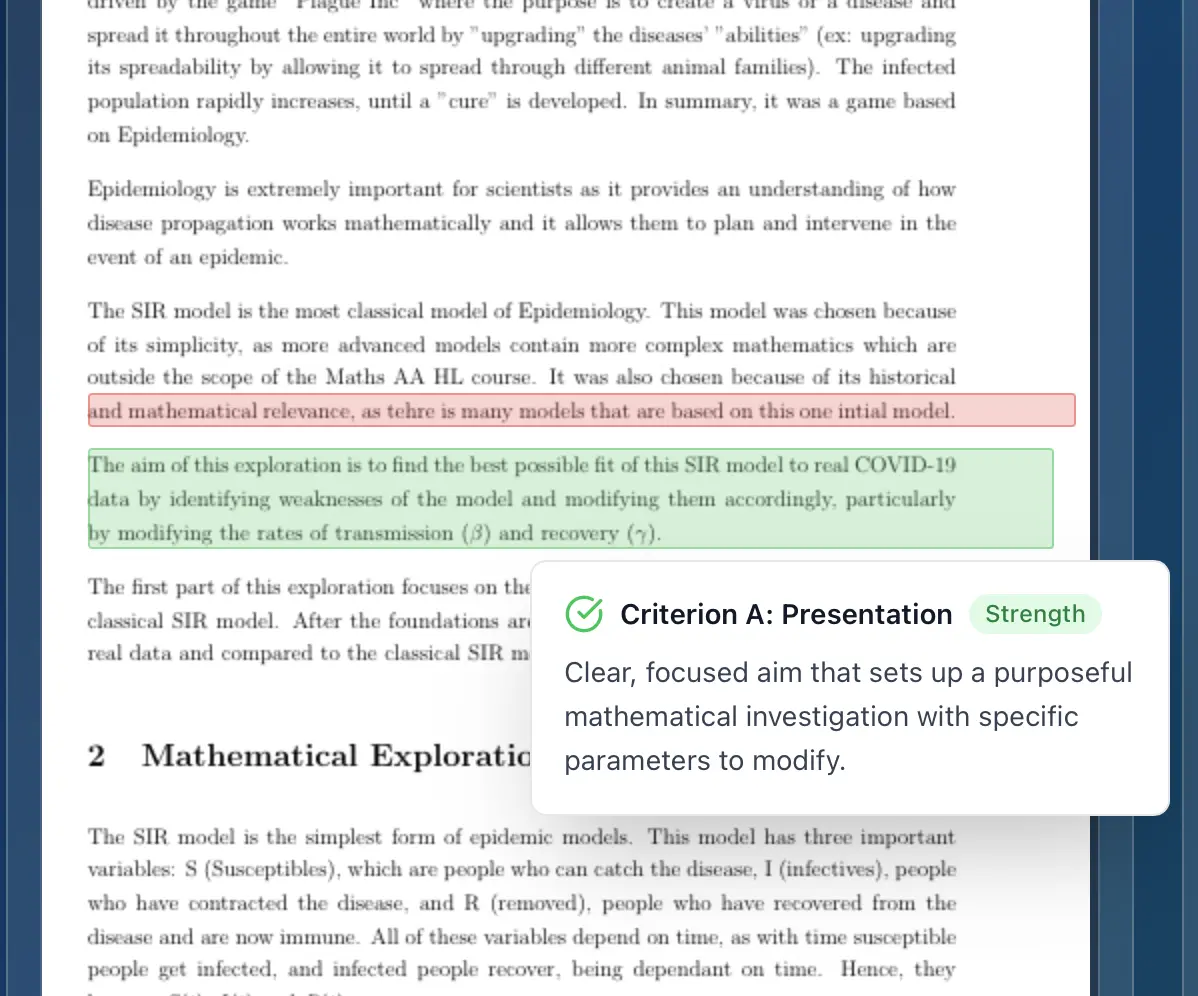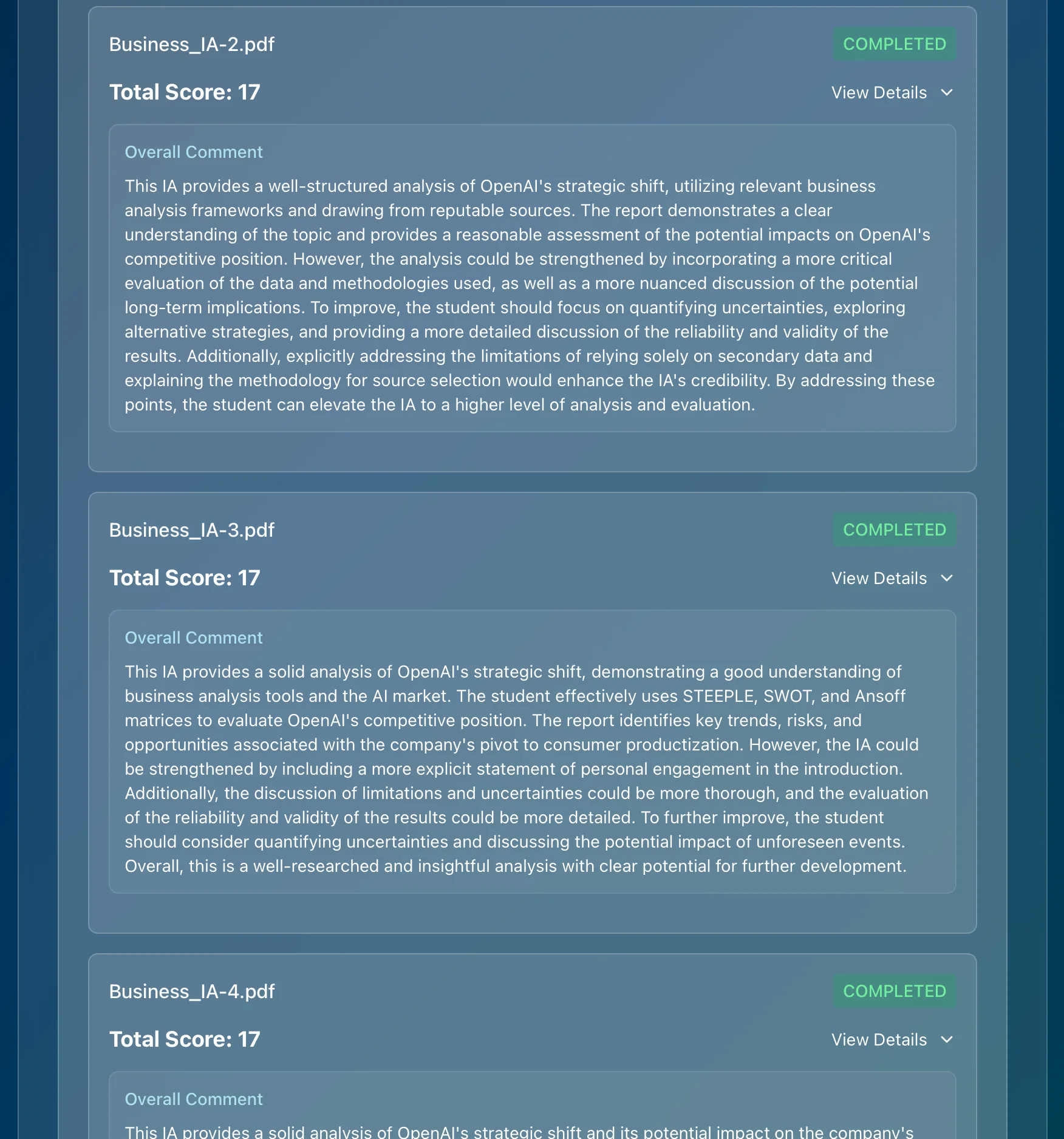Converting IB Grades to GPA: What You Need to Know
Understanding how your International Baccalaureate (IB) grades translate to a Grade Point Average (GPA) is crucial for college applications, scholarships, and future academic endeavors. This guide provides a clear and comprehensive explanation of the conversion process, addressing the common challenges and offering practical strategies to ensure an accurate representation of your IB achievements. We'll cover everything from the basic conversion scales to advanced tips on maximizing your GPA and even explore how AI is revolutionizing IB assessment. By the end of this post, you'll have a solid understanding of how to convert your IB grades to a GPA and how to leverage this information to your advantage.
Introduction: Unlocking the IB to GPA Conversion
The International Baccalaureate (IB) Diploma Programme is a rigorous and internationally recognized pre-university course. While IB uses a 7-point grading scale, many universities, especially in the United States, rely on the GPA system. Therefore, converting your IB grades to a GPA is essential for college applications. This process isn't always straightforward, as different universities may have varying conversion scales. This guide will walk you through the most common conversion methods, highlight potential pitfalls, and provide actionable advice to ensure your IB achievements are accurately reflected in your GPA. Whether you're an IB student, teacher, or parent, this information will empower you to navigate the college application process with confidence.
Struggling with IB Assessments?
Get instant, detailed feedback on your work with AI that understands IB criteria.

Understanding the IB Grading System
Before diving into the conversion process, let's quickly recap the IB grading system. The IB Diploma Programme consists of six subject groups, each graded on a scale of 1 to 7, with 7 being the highest. In addition to the subject grades, students also complete the Theory of Knowledge (TOK) and Extended Essay (EE), which together contribute up to 3 bonus points. The maximum possible score for the IB Diploma is 45 points (6 subjects x 7 points + 3 bonus points).
Common IB to GPA Conversion Scales
Several conversion scales are used to translate IB grades to GPA. Here are two of the most common:
Scale 1: A Simple Linear Conversion
This is a straightforward method where each IB grade corresponds to a specific GPA value:
- 7 = 4.0 GPA
- 6 = 3.7 GPA
- 5 = 3.3 GPA
- 4 = 3.0 GPA
- 3 = 2.0 GPA
- 2 = 1.0 GPA
- 1 = 0.0 GPA
Scale 2: A More Nuanced Conversion
Some universities use a more nuanced scale that accounts for the rigor of the IB program:
- 7 = 4.0 GPA
- 6 = 3.8 GPA
- 5 = 3.5 GPA
- 4 = 3.0 GPA
- 3 = 2.5 GPA
- 2 = 1.5 GPA
- 1 = 0.0 GPA
Example:
Let's say you achieved the following IB grades:
- English A: Language and Literature HL: 6
- History HL: 5
- Biology HL: 6
- Mathematics SL: 4
- French SL: 5
- Visual Arts SL: 7
- TOK/EE: 2 points
Using Scale 1, your GPA would be calculated as follows:
(3.7 + 3.3 + 3.7 + 3.0 + 3.3 + 4.0) / 6 = 3.5 GPA (excluding TOK/EE)
Using Scale 2, your GPA would be:
(3.8 + 3.5 + 3.8 + 3.0 + 3.5 + 4.0) / 6 = 3.6 GPA (excluding TOK/EE)
Remember to add the TOK/EE points to your total IB score before converting to GPA. These points can significantly impact your overall score.
How to Calculate Your GPA from IB Scores: A Step-by-Step Guide
Here's a detailed step-by-step guide to calculating your GPA from your IB scores:
- Gather Your IB Grades: Compile a list of your final IB grades for each subject.
- Choose a Conversion Scale: Research the specific GPA conversion scale used by the universities you're applying to. If a university doesn't specify a scale, use one of the common scales mentioned above.
- Convert Each IB Grade: Using your chosen conversion scale, convert each IB grade into its corresponding GPA value.
- Calculate the Average: Add up all the GPA values and divide by the number of subjects (typically 6). This will give you your unweighted GPA.
- Consider HL Weighting (If Applicable): Some universities may give extra weight to Higher Level (HL) courses. If this is the case, adjust the GPA values for HL courses accordingly before calculating the average. For example, you might add 0.5 to the GPA value for each HL course.
- Account for TOK/EE: The TOK and EE are worth up to 3 points. These points are added to your total IB score (out of 42) before converting to a GPA. They do not directly translate into a GPA value.
- Verify with University Requirements: Always double-check the specific GPA requirements and conversion policies of each university you're applying to.
Pro Tip: Get AI-Powered Grading
Stop second-guessing your grades. Get instant feedback aligned with official IB rubrics.

Common Challenges and Mistakes in IB to GPA Conversion
Converting IB grades to GPA can be tricky. Here are some common challenges and mistakes to avoid:
- Using the Wrong Conversion Scale: As mentioned earlier, different universities use different scales. Always research and use the correct scale for each university.
- Ignoring HL Weighting: Failing to account for HL weighting can significantly underestimate your GPA, especially if you took several HL courses.
- Misunderstanding TOK/EE Points: The TOK/EE points are added to your total IB score, not directly converted to GPA.
- Not Verifying with University Policies: University policies can change, so always verify the latest GPA requirements and conversion procedures.
- Assuming a Linear Conversion: Not all universities use a simple linear conversion. Some may have more complex formulas or consider other factors.
Advanced Tips and Strategies for Maximizing Your GPA
Here are some advanced tips to help you maximize your GPA during your IB years:
- Focus on HL Courses: Since HL courses are often weighted more heavily, prioritize excelling in these subjects.
- Master TOK and EE: The TOK and EE can contribute up to 3 bonus points, which can significantly boost your overall IB score and, consequently, your GPA.
- Seek Guidance from Your IB Coordinator: Your IB coordinator can provide valuable advice on GPA conversion and university requirements.
- Research University-Specific Policies Early: Start researching university-specific GPA policies early in your IB program to plan your courses and study strategies accordingly.
- Consider Retaking Exams (If Allowed): If you're not satisfied with your initial IB grades, consider retaking exams to improve your scores and GPA.
Technology and Modern Assessment: The Role of AI in IB Grading
Technology is rapidly transforming education, and the IB program is no exception. AI-powered tools are emerging to assist teachers and students with various aspects of the IB curriculum, including assessment and grading.
One of the most significant advancements is the development of AI grading assistants like Marksy. Marksy is designed specifically for the International Baccalaureate (IB) and provides instant, accurate, and detailed feedback on student work based on official IB rubrics. This helps teachers provide consistent and objective assessments, saving them valuable time and ensuring fairness.
How Marksy Helps:
- Rubric-Aligned Scoring: Marksy uses official IB rubrics to score student work, ensuring that assessments are aligned with the IB's rigorous standards.
- Detailed Criterion-by-Criterion Feedback: The AI provides detailed feedback on each criterion, helping students understand their strengths and weaknesses.
- Suggestions for Improvement: Marksy offers specific suggestions for improvement, guiding students on how to enhance their work and achieve higher scores.
- Time-Saving Benefits: By automating the grading process, Marksy frees up teachers' time, allowing them to focus on providing personalized instruction and support to their students.
AI grading tools like Marksy use sophisticated algorithms to analyze student work and provide objective feedback. This ensures that assessments are fair and consistent, regardless of the teacher or school. Furthermore, AI can identify patterns in student performance, allowing teachers to tailor their instruction to meet the specific needs of their students. By leveraging AI, educators can enhance the quality of IB assessment and provide students with the support they need to succeed.
Conclusion: Converting Your IB Grades to GPA with Confidence
Converting your IB grades to a GPA is a crucial step in the college application process. By understanding the different conversion scales, avoiding common mistakes, and leveraging advanced strategies, you can ensure that your IB achievements are accurately represented and that you maximize your chances of admission to your dream university. Remember to research university-specific policies, seek guidance from your IB coordinator, and consider using AI-powered tools like Marksy to enhance your understanding of IB assessment.
Next Steps:
- Calculate Your Current GPA: Use the steps outlined in this guide to calculate your current GPA based on your IB grades.
- Research University Requirements: Investigate the specific GPA requirements and conversion policies of the universities you're interested in.
- Explore AI Grading Tools: Discover how AI grading assistants like Marksy can help you improve your IB scores and streamline your grading workflow.
Ready to experience the power of AI in IB assessment? Try Marksy for free today and unlock your full potential!